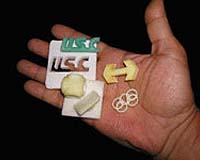Bluejacking
Mischief is often an engine of innovation. Figuring out how to make things do what you want them to do -- not necessarily what the designers want you to do -- is both fun and illuminating. Gibson wrote, "the street finds its own uses for things," and sometimes that use is as a medium for pulling pranks (c.f., "Flash Mobs").
Bluejacking is the latest manifestation of this desire to make mundane tools of communication interesting. In brief, it uses the "bluetooth" short-range wireless protocol built into an increasing number of mobile devices (everything from cell phones to Powerbooks) to send a short message to an unsuspecting recipient. Most of these devices are set to allow the transfer of virtual business cards and the like; "bluejacking" piggy-backs on this, putting pithy comments ("Nice shirt!" "ur cute" etc.) in place of business names and numbers. There's no way for someone to actually take over a remote device in this way -- "bluejacking" sounds more ominous than it really is -- but reactions to having odd little messages popping up on one's cell phone range from amusement to confusion.
The practice is relatively new, as bluetooth has only recently become a commonplace feature on mobiles, and seems to be more common in Europe than in the States. This is not terribly surprising; mobile phones are everywhere in Europe. It also seems to be a habit of the young.
 Security is a tricky thing. If given a choice between a security system that is 99.99% effective in stopping malevolent attacks or careless mistakes, and one which is only 95% effective, going with the 99.99% one seems like a no-brainer, right? Not necessarily.
Security is a tricky thing. If given a choice between a security system that is 99.99% effective in stopping malevolent attacks or careless mistakes, and one which is only 95% effective, going with the 99.99% one seems like a no-brainer, right? Not necessarily. In many cities in the UK, an average person is recorded by hundreds of cameras per day. These cameras are intended for public security, an unblinking eye watching over the citizens like some kind of older sibling. These closed-circuit TV (CCTV) cameras are connected back to a central police station, where officers keep an eye out for mischief and malcontents. When trouble appears, this central office can dispatch police to the scene.
In many cities in the UK, an average person is recorded by hundreds of cameras per day. These cameras are intended for public security, an unblinking eye watching over the citizens like some kind of older sibling. These closed-circuit TV (CCTV) cameras are connected back to a central police station, where officers keep an eye out for mischief and malcontents. When trouble appears, this central office can dispatch police to the scene. Biologists at the
Biologists at the  Although the Human Genome Project (and the various plant & animal genome projects that preceded it and continue on) was often hyped as the key to unlocking human biology, it's only the first step in a bigger process. Genes code for proteins. Of far greater utility than a genome map -- and of far greater complexity -- is a map of protein interaction, sometimes called a "proteome." Proteins form the building blocks of tissues, and their interactions are the basis for biological systems. In short, proteins actually carry out the details of being a living being.
Although the Human Genome Project (and the various plant & animal genome projects that preceded it and continue on) was often hyped as the key to unlocking human biology, it's only the first step in a bigger process. Genes code for proteins. Of far greater utility than a genome map -- and of far greater complexity -- is a map of protein interaction, sometimes called a "proteome." Proteins form the building blocks of tissues, and their interactions are the basis for biological systems. In short, proteins actually carry out the details of being a living being. We here at WorldChanging make plenty of references to Open Source Software and the wonderful crunchy goodness therein, but I suspect that most of the people reading this site have never tried out Linux on their own machines, feeling -- perhaps rightly -- that most Linux distributions are not made for mere mortals. While the most popular Linux versions have made great strides in ease-of-use and ease-of-installation, they still have the unpleasant requirement that you reformat at least part of your hard drive to give them a shot.
We here at WorldChanging make plenty of references to Open Source Software and the wonderful crunchy goodness therein, but I suspect that most of the people reading this site have never tried out Linux on their own machines, feeling -- perhaps rightly -- that most Linux distributions are not made for mere mortals. While the most popular Linux versions have made great strides in ease-of-use and ease-of-installation, they still have the unpleasant requirement that you reformat at least part of your hard drive to give them a shot. With the rise of
With the rise of  Plastic was to the 1960's what cryonics was to the 1980's -- symbolic of the Future. While freezing one's head after death never really made it to the mainstream, plastics are all around us. With a couple of recent developments, plastic may well again be the wave of the future.
Plastic was to the 1960's what cryonics was to the 1980's -- symbolic of the Future. While freezing one's head after death never really made it to the mainstream, plastics are all around us. With a couple of recent developments, plastic may well again be the wave of the future.